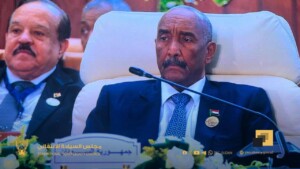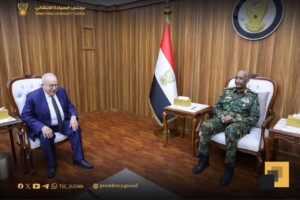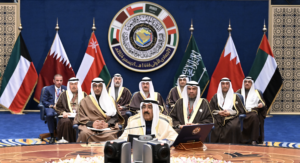Sudan army: End appointment of military governors
The High Command of the Sudanese Armed Forces (SAF) informed rebel leaders during the negotiations that it wished to end the appointment of generals as acting state governors.
 Sudan Armed Forces (File photo)
Sudan Armed Forces (File photo)
The High Command of the Sudanese Armed Forces (SAF) informed rebel leaders during the negotiations that it wished to end the appointment of generals as acting state governors.
The SAF command says that “the generals were appointed by the deposed regime of Omar Al Bashir, which raises a variety of difficulties. In a number of cases, it would be better if interim civil governors would manage the states until a peace agreement is signed.”
During the peace negotiations between the Sudanese government and armed movements in the South Sudanese capital in Juba over the past two months, the parties agreed on appointing new state governors after a peace accord has been reached.
Yasir Arman, Deputy Secretary General of the Sudan Revolutionary Front (SRF, a coalition of Sudanese armed opposition groups) said in a press release on Thursday that in the meantime, Khartoum may appoint civil governors who will rule the relevant state until a peace agreement has been reached and new governors will be appointed to all 18 states in the country.
SAF High Command: ‘The generals were appointed by the deposed regime of Omar Al Bashir, which raises a variety of difficulties…’
FFC
The Sudan Revolutionary Front (SRF) rebel alliance has warned against the collapse of the Juba Declaration of Principles and the torpedoing of peace negotiations if the Forces for Freedom and Change (FFC) insist on disregarding them in forming the Legislative Council and appointing the governors of the states.
They call for adherence to the agreement signed in Juba on September 11, which stipulates the formation of legislators and the appointment of governors only after the achievement of a peace agreement.
They said in the event that happens, it will be “the straw that breaks the camel’s back”.
‘A number of states cannot be governed by governors from among the FFC, such as war-torn Darfur, Blue Nile state and South Kordofan, and marginalised eastern Sudan’ – El Tom Hajo, chairman of SRF Legislative Council
The chairman of the SRF Legislative Council, El Tom Hajo, told the Blue Nile Satellite Channel on Tuesday, that a number of states cannot be governed by governors from among the FFC, such as war-torn Darfur, Blue Nile state and South Kordofan, and marginalised eastern Sudan.
Despite the resumption of the peace negotiations scheduled to start on November 21, the FFC is determined to appoint state governors and MPs four days before this date, he said, asking why they cannot wait until the end of the talks.
Jamal Idris, Head of the Nasserist Unionist Party and leading member of the FFC Central Council, said that the FFC were not consulted regarding the contents of the Juba Declaration. “The two parties were not fully authorised to sign the agreement.”
“The decision of the FFC to soon appoint civilian governors to the 18 states in Sudan is motivated by the fact that change has not occurred in the states so far, and that the focus has been on Khartoum, while leaving affiliates of ousted Omar al Bashir’s National Congress Party ruling the states.”
Democratic Unionist Party leader Yasin Hamza earlier warned about a possible conflict between the FFC and the armed movements over the appointment of governors and the national Parliament.
He said that appointing governors before reaching a peace agreement will create a crisis that will delay the peace process and lose confidence among the negotiating parties.
Following the adjournment of last month’s peace negotiations in Juba, the SPLM-N El Hilu stated that disagreement between the delegation of the government and the movement over secularity in the country and the right of self-determination for South Kordofan prevented the parties from agreeing and signing the Declaration of Principles.
“The SPLM will continue to negotiate with the transitional government to put a logical end to the war in the country by reaching a just, comprehensive, and sustainable peace agreement,” spokesman El Jak Mahmoud said in a statement.
He stressed the SPLM-N El Hilu’s adherence to the need to separate religion from the state as a principle to build a democratic, secular, and viable Sudan, in which all can enjoy rights based on citizenship.
He explained that the right of self-determination remains a negotiating position that the SPLM-N El Hilu faction will uphold as a human, legal, and democratic right in case state secularism is rejected, and the new government insists on adhering to the laws of Islamic Sharia and the principles of Islamic and Arab ideology.
SPLM-N Agar
The Sudan People’s Liberation Movement faction under the leadership of Malik Agar in Blue Nile state (SPLM-N Agar), has demanded self-governance for the Two Areas (Blue Nile and South Kordofan), to give full rights to the legislation in the region.
In a statement after the conclusion of its leadership conference on Wednesday, the SPLM-N Agar said that secularism is not a condition for ending the current war.
The statement called for coordination between the two SPLM-N factions regarding their negotiating positions with the Sudanese government, to serve the interests of the peoples of the Two Areas, Sudan, and peace.
The current change in Sudan heralds the possibility of a strategic transition from armed struggle to peaceful political struggle, the SPLM-N Agar stated.
The Blue Nile state rebel faction demanded 80 per cent of the legislative and executive powers in Blue Nile state and South Kordofan, and 20 per cent for members of the FFC. As for the resources in the two regions, 70 per cent of the yields must be allocated to development in the first ten years, and 50 per cent as a fixed percentage thereafter.
It further stressed the need to establish mechanisms for transitional justice and to immediately hand over Omar Al Bashir and those wanted to the International Criminal Court in The Hague.
As for the relations between Sudan and South Sudan, the movement called for a union that will form the basis of a broader regional union.
Radio Dabanga’s editorial independence means that we can continue to provide factual updates about political developments to Sudanese and international actors, educate people about how to avoid outbreaks of infectious diseases, and provide a window to the world for those in all corners of Sudan. Support Radio Dabanga for as little as €2.50, the equivalent of a cup of coffee.












 and then
and then